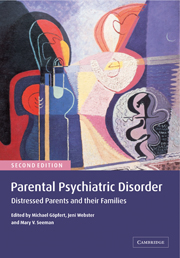Book contents
- Frontmatter
- Contents
- List of contributors
- Foreword
- Preface
- Part I Basic issues
- Part II Comprehensive assessment and treatment
- 6 ‘The same as they treat everybody else’
- 7 Formulation and assessment of parenting
- 8 Mentally ill mothers in the parenting role: clinical management and treatment
- 9 Perinatal mental illness: nature/nurture
- 10 Assessment and treatment issues when parents have personality disorders
- Part III Specific disorders: the impact on parent–child relationships
- Part IV Specific treatments and service needs
- Part V Child-sensitive therapeutic interventions
- Part VI Models for collaborative services and staff training
- Afterword
- Index
- References
10 - Assessment and treatment issues when parents have personality disorders
from Part II - Comprehensive assessment and treatment
Published online by Cambridge University Press: 09 August 2009
- Frontmatter
- Contents
- List of contributors
- Foreword
- Preface
- Part I Basic issues
- Part II Comprehensive assessment and treatment
- 6 ‘The same as they treat everybody else’
- 7 Formulation and assessment of parenting
- 8 Mentally ill mothers in the parenting role: clinical management and treatment
- 9 Perinatal mental illness: nature/nurture
- 10 Assessment and treatment issues when parents have personality disorders
- Part III Specific disorders: the impact on parent–child relationships
- Part IV Specific treatments and service needs
- Part V Child-sensitive therapeutic interventions
- Part VI Models for collaborative services and staff training
- Afterword
- Index
- References
Summary
Many disturbed parents referred for parenting assessments do not present with acute mental illness, but with severe, emotionally unstable, borderline personality disorders. Here we usually find a persistent identity disturbance; self-damaging impulsivity; marked reactivity of mood; a pattern of unstable and intense interpersonal relationships; frequent displays of anger; chronic feelings of emptiness; transient paranoid ideation and dissociative symptoms. In our view the major underlying problem of this unfortunate condition is one of disconnectedness. We see this as profound difficulties of establishing and maintaining connecting relationships of mutuality (see Adshead et al., Chapter 15). These difficulties present both internally, that is, between parts of the self, and externally, in relation to partners, children and others – including therapists. Whilst there is usually plenty of observable powerful interacting – or ‘acting out’ – going on, this does not lead to a mutually connecting way of relating. Such individuals show levels of extreme emotional sensitivity and fluctuating affective states. These can provoke at times overinvolved or profound distancing behaviours. The primary concern is not about relating and negotiating with others, but about how to regulate and control one's own feeling states. There is a considerable preoccupation with the experience of others – including children – being able to trigger powerful and problematic feelings. To cope with this the parent often uses angry defences against being emotionally vulnerable. This can take the form of self-hate or attack on child, partner or helper.
Keywords
- Type
- Chapter
- Information
- Parental Psychiatric DisorderDistressed Parents and their Families, pp. 139 - 158Publisher: Cambridge University PressPrint publication year: 2004

